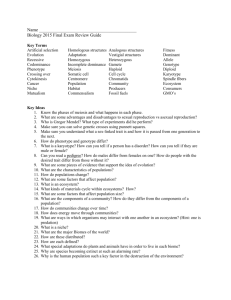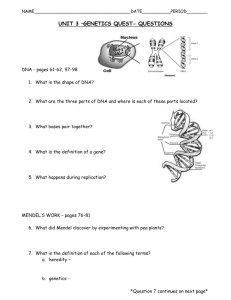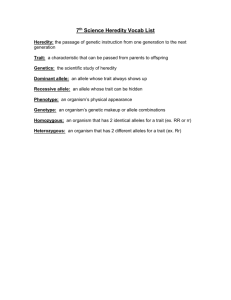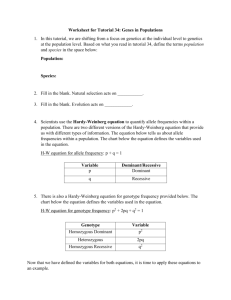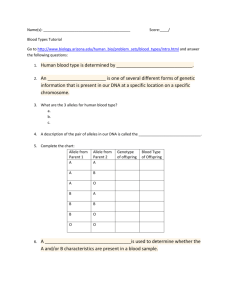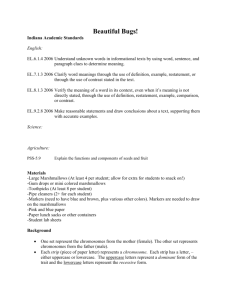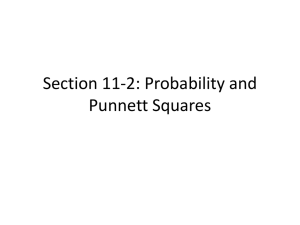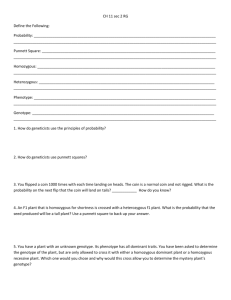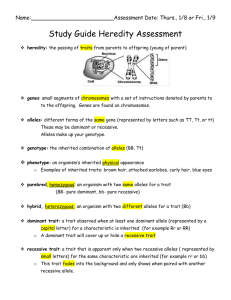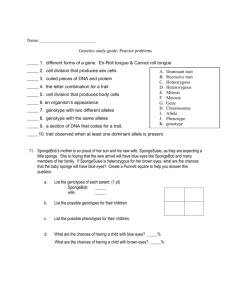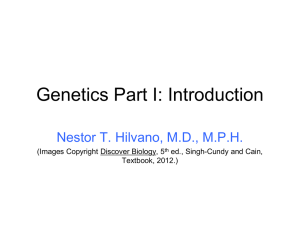Genetics Review sheets
advertisement
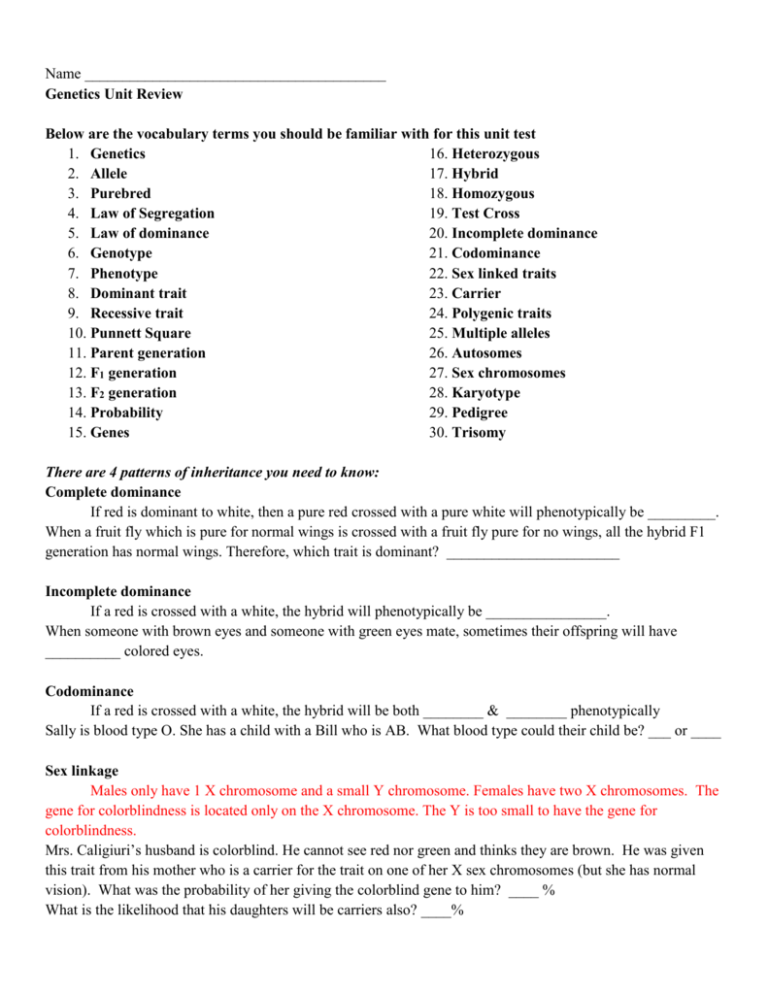
Name ________________________________________ Genetics Unit Review Below are the vocabulary terms you should be familiar with for this unit test 1. Genetics 16. Heterozygous 2. Allele 17. Hybrid 3. Purebred 18. Homozygous 4. Law of Segregation 19. Test Cross 5. Law of dominance 20. Incomplete dominance 6. Genotype 21. Codominance 7. Phenotype 22. Sex linked traits 8. Dominant trait 23. Carrier 9. Recessive trait 24. Polygenic traits 10. Punnett Square 25. Multiple alleles 11. Parent generation 26. Autosomes 12. F1 generation 27. Sex chromosomes 13. F2 generation 28. Karyotype 14. Probability 29. Pedigree 15. Genes 30. Trisomy There are 4 patterns of inheritance you need to know: Complete dominance If red is dominant to white, then a pure red crossed with a pure white will phenotypically be _________. When a fruit fly which is pure for normal wings is crossed with a fruit fly pure for no wings, all the hybrid F1 generation has normal wings. Therefore, which trait is dominant? _______________________ Incomplete dominance If a red is crossed with a white, the hybrid will phenotypically be ________________. When someone with brown eyes and someone with green eyes mate, sometimes their offspring will have __________ colored eyes. Codominance If a red is crossed with a white, the hybrid will be both ________ & ________ phenotypically Sally is blood type O. She has a child with a Bill who is AB. What blood type could their child be? ___ or ____ Sex linkage Males only have 1 X chromosome and a small Y chromosome. Females have two X chromosomes. The gene for colorblindness is located only on the X chromosome. The Y is too small to have the gene for colorblindness. Mrs. Caligiuri’s husband is colorblind. He cannot see red nor green and thinks they are brown. He was given this trait from his mother who is a carrier for the trait on one of her X sex chromosomes (but she has normal vision). What was the probability of her giving the colorblind gene to him? ____ % What is the likelihood that his daughters will be carriers also? ____% Punnett Square time!!!! 1. In humans, webbed toes are a dominant trait. Cross a hybrid, webbed toed person with one who has normal toes. Give the Phenotype and genotype probabilities ____ = Webbed toes Phenotype probability _____% Webbed ______% normal ____ = normal toes Genotype probability ___% WW, ___%Ww, ___% ww Parent cross: ____ x ____ 2. For the same trait, cross two hybrids Give the Phenotype and genotype probabilities ____ = Webbed toes Phenotype probability _____% Webbed ______% normal ____ = normal toes Genotype probability ___% WW, ___%Ww, ___% ww Parent cross: ____ x ____ 3. When someone pure for curly hair mates with someone with straight hair, wavy hair results. This is an example of incomplete dominance. ___ = Curly hair allele ____ Curly hair genotype (use two alleles please) ___ = Straight hair allele ____ Straight hair genotype ____ Wavy hair genotype Parent cross: _____ x _____ Phenotype probability ___% Curly, ___% Wavy, ___% Straight Genotype probability ___ % cc, ___% cs, ___% ss 4. For the same trait, cross two of their wavy haired children Parent cross: _____ x _____ Phenotype probability ___% Curly, ___% Wavy, ___% Straight Genotype probability ___ % cc, ___% cs, ___% ss 5. Human blood typing involves 3 alleles (multiple alleles). They are the A, B and o allele. Remember the formula A = B >o. ___ = A allele ___ = B allele ___ = o allele Blood Phenotype Possible Blood Genotype A AA or Ao B BB or Bo AB AB O oo Beth has B type blood. Her father was AB and her mother was O. Beth’s husband has AB blood. What blood types are possible in their children? Parent Cross: ______ x _____ Possible Blood types? ___ A ___B ___AB ___O Karyotypes. Look at the following karyotypes . Determine which are male and which that of a female. Then also circle if you see any chromosomal abnormalities. Pedigrees follow a trait from generation to generation. Below is a pedigree of albinism. 1 Circles are females, squares and males and if colored in, they have the trait (albinos) N = Normal n = Albino 2 3 4 Give the genotype for each of the following individuals on the pedigree 1 _____ 2_____ 3_____ 4_____ 5_____ 5
